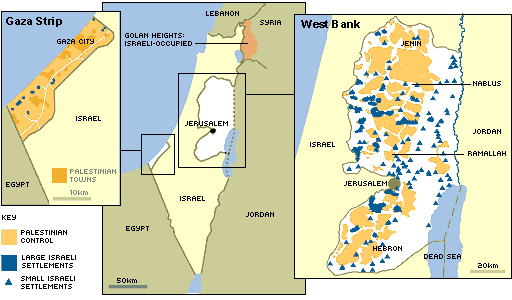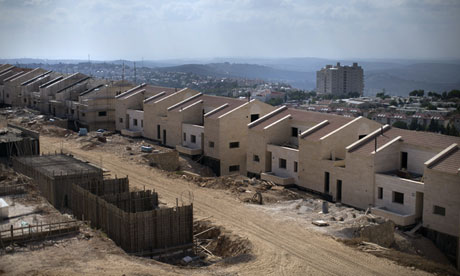EU acknowledges obligation to not recognize Israeli annexation of Palestinian territory
 Sunday, July 28, 2013 at 11:15PM
Sunday, July 28, 2013 at 11:15PM http://www.bdsmovement.net/2013/eu-guidelines-press-release-11211
July 18, 2013 - See more
EU acknowledges obligation to not recognize Israeli colonisation and annexation of occupied Palestinian territory. European Investment Bank to stop loans to ‘virtually all’ major Israeli businesses and public bodies
New European Union guidelines will prevent Israeli ministries, public bodies and businesses that operate in occupied Palestinian territory from receiving loans worth hundreds of millions of Euros each year from the European Investment Bank, it emerged today. The EU will also stop awarding grant funding to Israeli ministries, public bodies or private businesses for activities that take place in occupied Palestinian territory, even if they are headquartered inside Israel’s pre-1967 borders.
According to a leaked version of the guidelines, the EU aims to ensure that its own institutions respect the obligation to not recognize Israeli sovereignty in the Palestinian territory occupied by Israel since 1967, including the Palestinian West Bank, East Jerusalem and Gaza Strip as well as the Syrian Golan Heights.
The new guidelines exclude any Israeli entity with activity in occupied Palestinian territory from participating in EU financial instruments such as loans. Among those excluded from receiving loans from the European Investment Bank (EIB) will be major Israeli banks including Bank Hapoalim, Mizrahi Tefahot Bank and Bank Leumi because they all operate illegally in the occupied Palestinian territory (OPT), including by having branches in illegal Israeli settlements. Bank Hapoalim received a €75m credit line from the EIB in 2006 and is likely to have put some of that credit towards its wide-ranging settlement financing operations.
Recent EIB loans such as the €120m lent to national Israeli water company Mekorot in 2011 or the €40m lent to electric car company Better Place in 2012 would not have been granted under the new rules as both companies have sizeable illegal settlement activities. The EIB has provided finance amounting to almost €1 billion to Israeli entities since 1981.
Zaid Shuaibi, spokesperson for the Palestinian BDS National Committee (BNC), the largest coalition in Palestinian society that forms the Palestinian leadership and reference for the global BDS movement, said:
“Virtually all Israeli ministries and national authorities, major Israeli banks and other private businesses participate in the discrimination and oppression of our people and the colonization of our country. Many of them play a key role in maintaining and expanding illegal Israeli settlements and infrastructure of the occupation regime. These new guidelines should all but end Israeli eligibility for EIB loans.”
“Regardless of the scope and reach of these European measures they are already sending strong signals around Europe and the world at large that the era of sanctions against Israel has started. These guidelines will undoubtedly further erode Israel’s standing in international public opinion and encourage European and other citizens to seriously consider joining the fast growing BDS movement for Palestinian freedom, justice and equality. The ‘S’ in BDS is becoming more realistic, as a result.”
Michael Deas, BNC Coordinator in Europe, explained:
“These guidelines show that grassroots civil society pressure is forcing the European Union to acknowledge its legal responsibility to not recognize Israel’s regime of occupation, colonization and apartheid against the Palestinian people and to end some aspects of its deep complicity in maintaining this illegal and criminal system.”
The new guidelines have also been welcomed by students and conscientious academics in Palestine and Europe who have been campaigning against EU funded joint projects between European universities and illegal settlement companies such as cosmetics firm Ahava, which will also be excluded under the new EU eligibility criteria, or between European academic institutions and their Israeli counterparts, all of which are deeply complicit in planning, implementing and justifying Israel’s occupation and apartheid.
“Similar guidelines should also be adopted in order to bring an end to the shameful EU policy of awarding research funding to Israeli military companies, such as Elbit Systems, that ‘field test’ their deadly systems on Palestinian and other Arab civilians. Israeli military companies provide the weaponry and technology that enable Israel to commit atrocities and daily violations of human rights. European taxpayers will wonder why public money is being handed over to Israeli arms companies at a time of deep public spending cuts,” added Shuaibi.
Many leading international figures, including Nobel laureates, have endorsed the Palestinian civil society call for a military embargo against Israel and its weapons companies.
Shuaibi said:
“Although these guidelines are an important step in the right direction, they do not absolve the EU from the legal responsibility to not recognize and support Israel’s regime of occupation, colonization and apartheid in many other areas. In the area of trade, for example, mere labeling of products from the illegal settlements is not enough, because they can still be sold in European markets. They should be banned completely, because the EU has a responsibility to ensure that Israeli settlements do not benefit from trade in European markets,”
“Moreover, we have yet to see how these guidelines will be implemented by the EU. Civil society, including BDS campaigners, will have to play an important role in monitoring their implementation, making sure that all ineligible Israeli entities are excluded in practice from receiving EU money.”
“As Israel prepares to ethnically cleanse more than 30,000 Bedouin Palestinians from their land in the Naqab (Negev) desert in the south of Israel, all of us will have to work hard to make the European Union recognize that Israeli apartheid is the same on both sides of the green line, and that the EU has a responsibility to not recognize the human rights abuses committed by Israeli public and private entities against Palestinian citizens of Israel and Palestinian refugees.”
NOTES TO EDITORS
1. The new rules for eligibility for European Union ‘financial instruments’ such as the European Investment Bank are laid out in section 12 b) of the guidelines, which state “In the case of financial instruments, Israeli entities will be considered eligible as final recipients if they do not operate in the territories referred to in point 2 [those occupied by Israel in 1967], either in the framework of EU-funded financial instruments or otherwise.”
http://www.eccpalestine.org/wp-content/uploads/2013/07/COM-Notice-guidelines-on-IL-and-EU-funding-instruments-compact.pdf
2. Many major Israeli banks operate branches inside occupied Palestinian territory and provide loans to illegal Israeli settlements
http://www.whoprofits.org/company/bank-hapoalim http://www.whoprofits.org/content/financing-israeli-occupation
3. More information on the operations inside occupied Palestinian territory of Mekorot and Better Place is available at the following links
http://electronicintifada.net/content/quartet-ex-envoys-investment-helps-israel-greenwash-settlements/8805
http://stopthewall.org/sites/default/files/Mekorot%20Factsheet%20Final.pdf
4. Elbit Systems – Israel’s leading military company, has received generous EU funding despite its role in supplying drones to Israel used to kill civilians and constructing Israel’s apartheid wall, declared illegal in 2004
http://www.stopthewall.org/stop-eu-research-funding-elbit-iai-and-other-israeli-companies
**********************************************************************************
http://www.guardian.co.uk/world/2013/jul/26/israel-freezes-co-operation-eu-palestinian
Israel freezes co-operation with EU in Palestinian territories
Move follows European Union directive banning funding for bodies linked with Israeli settlements
Harriet Sherwood The Guardian 26 July 2013

Israel has frozen co-operation with the European Union on work in thePalestinian territories in retaliation for an EU directive banning funding or grants for bodies with links to Israeli settlements.
The move, authorised by the defence minister, Moshe Ya'alon, affects all projects requiring permits from the Civil Administration, which governs Area C, the 60% of the West Bank under full Israeli control; access of EU diplomats and representatives to Area C and Gaza; and joint meetings.
No permits have been issued to EU humanitarian aid workers to enter Gaza for several days, according to a western diplomatic source.
"We are freezing the relationship on everything," said an Israeli official. "We did this as soon as we heard [about the directive]. We can't act like nothing happened."
The EU provides aid and equipment to Palestinian communities in Area C, many of whom are threatened with displacement and the demolition of their homes, animal shelters and other structures. The EU also helps train Palestinian security forces.
The directive, published in Brussels last Friday, bans the award of grants, funding or prizes to Israeli institutions located in or with links to settlements across the pre-1967 line. It was met with a furious reaction in Israel, with some claiming it could derail moves towards resuming peace negotiations.
The EU is also considering guidelines for its member states on thelabelling of goods and produce which hail from settlements in order to allow consumers to make informed choices on purchases.
The EU was "concerned by reports that the Israeli ministry of defence has announced a number of restrictions affecting EU activities supporting the Palestinian people", said an EU source in Israel. "We have not received any official communication from the Israeli authorities. Our delegations on the spot are seeking urgent clarifications."
The EU and the Civil Administration are thought to have had constructive dialogue over projects in Area C, despite the demolition and threatened demolition by the Israeli military of a number of structures, such as solar panels, funded by European NGOs.
In April, the EU missions in Ramallah and Jerusalem issued a statement criticising the destruction of 22 structures in eight locations in Area C.
******************************************************************************
 APJP |
APJP |  Post a Comment |
Post a Comment |